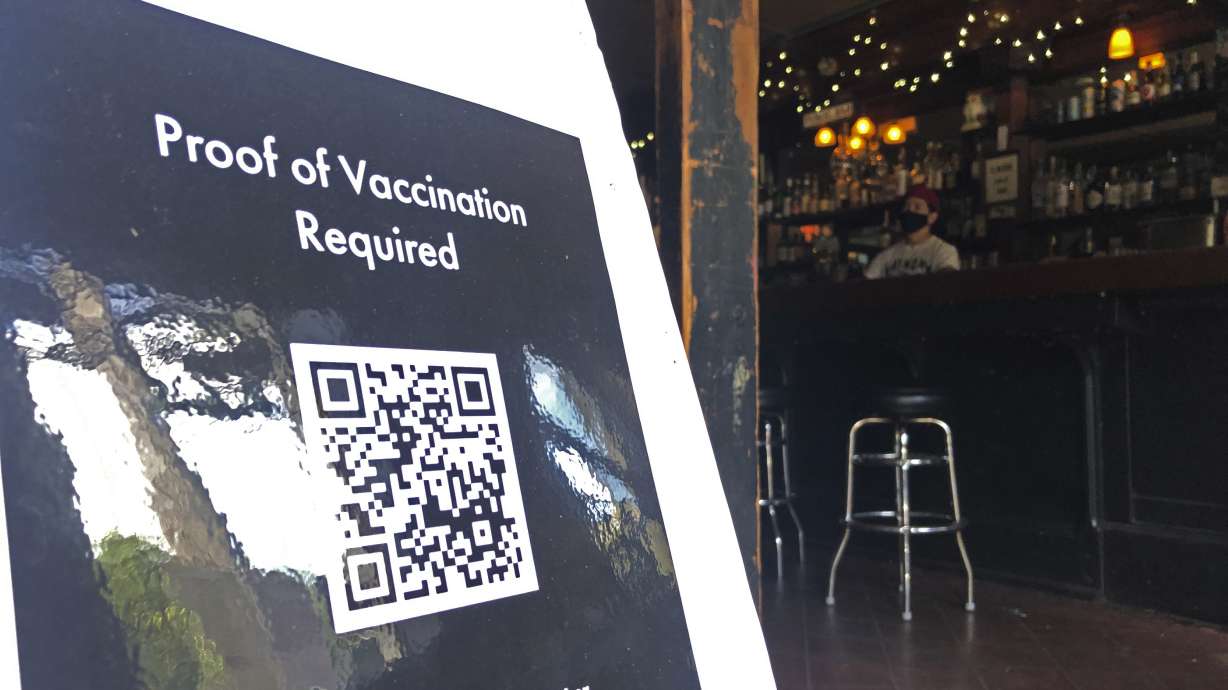Estimated read time: 5-6 minutes
This archived news story is available only for your personal, non-commercial use. Information in the story may be outdated or superseded by additional information. Reading or replaying the story in its archived form does not constitute a republication of the story.
SALT LAKE CITY — Big companies with presences in Utah like Adobe, Goldman Sachs, Facebook and Deloitte are requiring vaccinations for employees and people who go inside their facilities, but there is still vocal local and national opposition against such requirements and some companies can't afford to lose employees during the labor shortage.
How are Utah businesses handling this controversial issue, especially now that the Food and Drug Administration has officially given full approval for the Pfizer vaccine?
Vaccine requirements for employment are hardly new, and companies have been requiring that employees receive vaccinations, including seasonal flu shots, in order to protect the rest of the company's employees. Private companies have more flexibility when it comes to vaccine mandates. Employers are legally allowed to require vaccinations as long as they allow for exemptions in compliance with the Americans with Disabilities Act and the 1964 Civil Rights Act.
A recent Associated Press poll showed that about 6 in 10 Americans support mask and vaccine requirements for students and teachers in K-12 schools.
Utah-based tech darling Qualtrics released a study in March showing that the majority of employees support requiring vaccination. The data came from a survey of more than 1,000 people across the US. However, a follow-up survey from this month shows that almost a quarter of employees would strongly consider leaving their place of employment if their bosses mandated vaccines.
And more than half of tech workers would consider leaving their jobs if vaccine mandates were not in place, which is particularly relevant in a tech industry-heavy state like Utah.
Companies are stuck in the middle, knowing that they will likely lose employees in the middle of a nationwide labor shortage by making any definitive decision, so most are coming up with a solution that is somewhere in-between.
"As companies look to the future, they need to capture insights to help them determine how to reopen offices, implement safety measures, and gauge employee and customer comfort with vaccine mandates," said Jay Choi, chief product officer for Qualtrics.
"Our study found that 2 out of 3 workers say they would support vaccine mandates, while more than half say they are more likely to support companies that require employees to be vaccinated. Insights like these are good for business and help companies deliver better experiences in the future of work."
Qualtrics is ultimately leaving the choice up to its employees instead of mandating vaccinations.
"We are encouraging our employees to get vaccinated and ensuring they have the time they need away from work to do so, but we are not mandating it. We have various guidelines tailored for regional locations to align with local guidelines. For example, in our offices in the U.S. that have been identified to open at a limited capacity, we ask that employees and visitors follow CDC and local guidelines on masks and social distancing," M. J. Henshaw, a member of the Qualtrics public relations team, said in a statement.
As companies look to the future, they need to capture insights to help them determine how to reopen offices, implement safety measures, and gauge employee and customer comfort with vaccine mandates.
–Jay Choi, chief product officer for Qualtrics
Other Utah companies like SkyWest currently have similar policies — strongly encouraging but not requiring. Unlike many hospitals and health care organizations nationally, Intermountain Healthcare is also focusing on encouraging and Dr. Tamara Sheffield, medical director of community health and and prevention at Intermountain Healthcare, reported that 75% of its staff had been vaccinated.
Some companies, like Domo and Overstock, are waiting to decide about vaccine requirements and have delayed the return to in-person work and have more time to figure out what they will do regarding vaccines. And some companies have a patchwork of shifting policies working around vaccine requirements by offering remote work, requiring masks and social distancing, or making accommodations for at-risk workers.
"We will not be requiring any sort of in-person presence sooner than January 2022. Employees have the option to come to the office now and we are not currently requiring proof of vaccination. We plan to use this extra time to learn how we'd like to approach reentry while meeting our original outbreak response objectives," said Megan Herrick, vice president of communications for Overstock.
Local restaurants have a wide variety of requirements, but the Green Pig Pub, Kimi's Chop & Oyster House and the Bayou in Salt Lake City all have a vaccine requirement for employees, and the Bayou also requires proof of vaccination from its diners.
Sundance and USANA Amphitheater will require both attendees and employees to be vaccinated, and the Salt Lake City Twilight Concert Series will require employees but not attendees to be vaccinated. Other Utah music venues, and even some touring acts, have issued recommendations or requirements regarding masking and vaccinations.
On a government level, President Joe Biden has mandated vaccinations or routine testing for millions of federal workers, and Utah Lt. Gov. Deidre Henderson said that she and Gov. Spencer Cox fully support any local businesses that require employees to be vaccinated. And a Utah law that banned the state government from mandating COVID-19 vaccinations expired when the Pfizer vaccine was fully approved, meaning that schools, local governments and taxpayer-funded institutions in Utah can require that their employees get vaccinated.
Now that the law is no longer in effect, state colleges and universities have been deliberating on how to tackle this issue as well. University of Utah, Utah State University and Westminster College have joined hundreds of universities nationwide in issuing vaccine requirements for students, faculty and staff, while Brigham Young University strongly encourages vaccinations.










